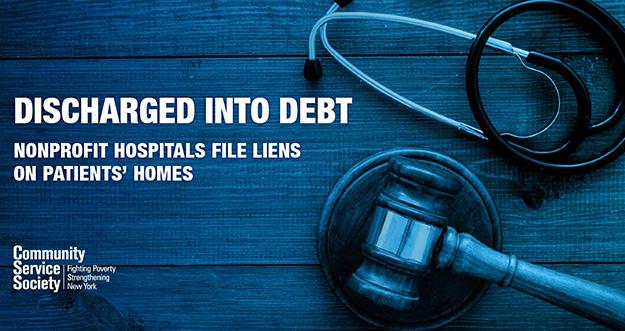Charitable Hospitals in New York Placed 4,880 Liens

During times of difficulty, many people naturally look to faith or religious institutions for assistance. But several hospital systems, including those owned by religious charities, appeared to betray that trust by placing liens on the homes of people who fell on hard times and were unable to satisfy medical debt. According to the November 2021 report, “Discharged into Debt: Nonprofit Hospitals File Liens on Patients’ Homes” by the Community Service Society, charitable hospitals in New York imposed 4,880 liens on the homes of patients with outstanding medical bills. Many of these same institutions received taxpayer money to defray medical debt. For instance, the report noted the hospitals collected over $442 million from the state’s Indigent Care Pool to help alleviate uncompensated care. These institutions accepted state funds and then ag-gressively pushed indigent patients into physical and financial ruin.
Discharged in Debt
The Discharged into Debt report, which is part of a broader series on medical debt, detailed the adverse impact of liens: “A judgment lien clouds title to property and can prevent the homeowner from refinancing or obtaining an additional loan, including a home equity loan. As a result, a judgment lien can reduce the value of what is, for most people, their main asset and source of future economic security.”
To understand the significance of this, one must appreciate that many people delay seeking medical attention due to the high cost of medi-cal care. The report found that over half of New Yorkers struggle with healthcare affordability. For persons in this category, they may only seek care when they are desperate but even then, many worry about the repercussions of being unable to pay. They have reason to worry as over half (58 percent) of all collection actions are for medical debt according to the U.S. Consumer Financial Protection Bureau.
“Former Vice President Hubert Humphrey famously said, ‘The moral test of government is how that government treats those who are in the dawn of life, the children; those who are in the twilight of life, the elderly; those who are in the shadows of life, the sick, the needy and the handicapped,’” said Nancy Hagans, President, NYSNA. “If there is truth to that sentiment, then the treatment of persons who are both ill and poor is shameful and casts a weighty cloud over those that consider themselves charitable institutions.”
According to the Community Services Society’s report, “Nearly 80 percent of the liens occur in counties with median incomes that are below 300 percent of poverty for a family of four. For residents in these counties, home ownership is crucial to their family’s economic security and physical health.” How does one recover if they are constantly worried about whether they’ll have a home to recover in, or whether their wages will be garnished due to medical debt.
Mocking Their Mission
Equally troubling, these health systems allegedly entered the industry to provide compassionate care. They have not only made a mockery of their mission, but they have also complicated life for scores of people. We know that home ownership is a way to not only build wealth, but to transfer wealth from one generation to another. Placing liens on a person’s home therefore impacts not only the homeowner and their fam-ily, but future generations. Additionally, the people most impacted are those who lack significant resources to begin with and many are people of color.
Things Will Get Worse
If 2017 through 2018 is par for the course in terms of the behavior of charitable hospital systems in New York, one shudders to think of the toll the pandemic will have on persons who became sick, lost their jobs, buried loved ones, and fell behind on medical debt. Of all institutions, hospital systems understand uniquely the strain that the pandemic placed on the nation. They watched their caregivers, including doctors and nurses succumb to COVID-19, experience burnout, or struggle to work under the strain of an unrelenting virus. They also treated untold sums of people. And while hospital systems should be compensated, it is unfair to accept state resources and then engage in predatory be-havior of those least able to pay.
This report helps explain NYSNA’s belief in and advocacy for single-payer, universal healthcare. It also speaks to the need for policymakers to hold accountable, health systems that simultaneously accept state funds and then aggressively pursue sick patients. We do not need to watch more people lose their home, struggle to recover from illness, or be unable to transfer wealth to their children and grandchildren to know that placing liens for medical debt is immoral and wrong. Hopefully, state elected officials will put a stop to this awful practice.
Source
https://www.cssny.org/publications/entry/discharged-into-debt-nonprofit-hospitals-file-liens-on-patients-homes